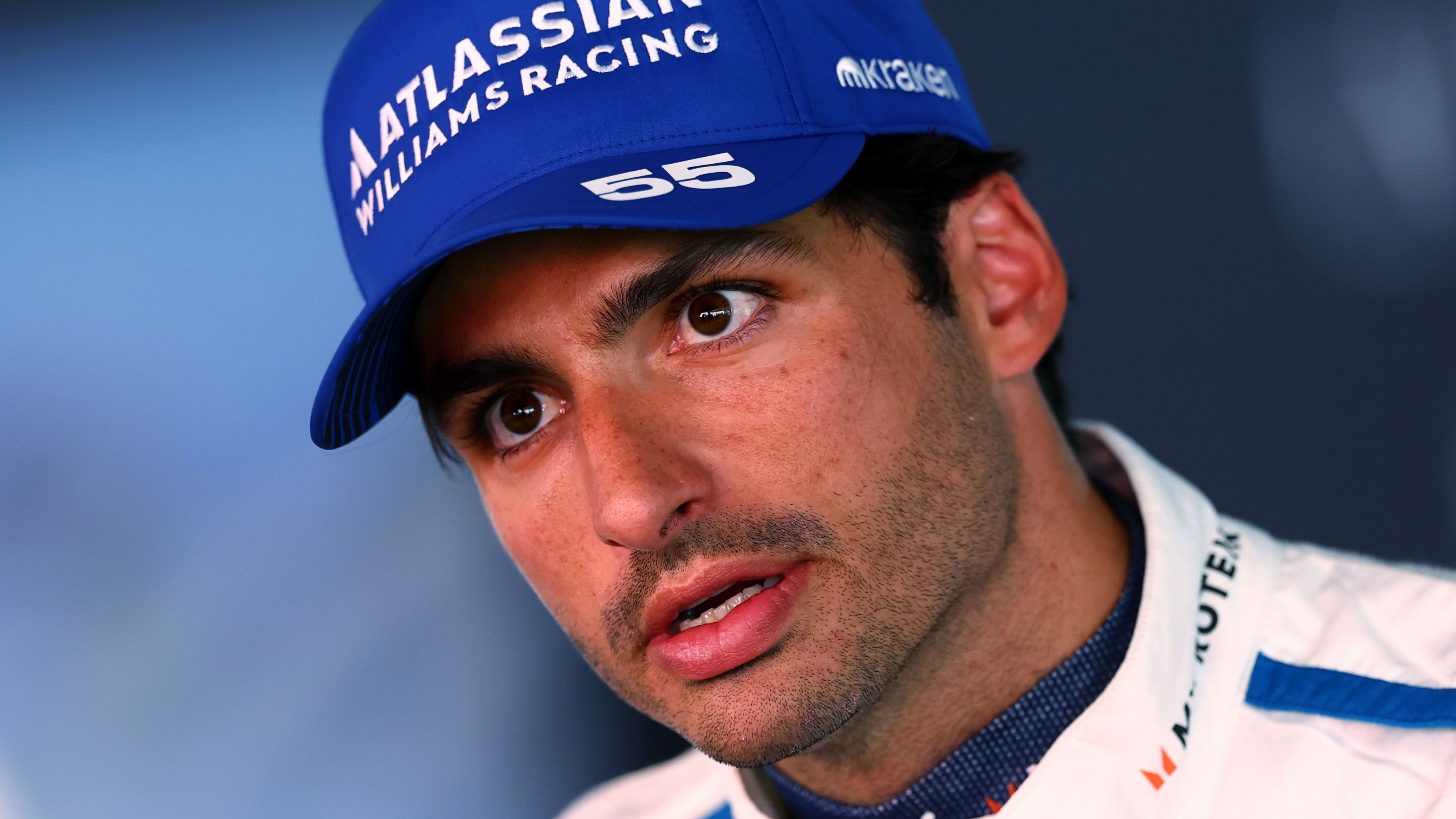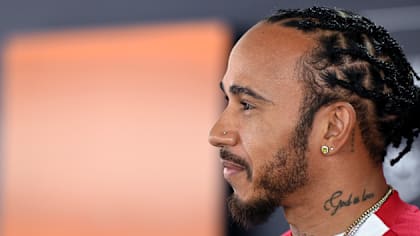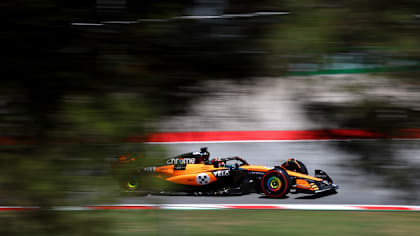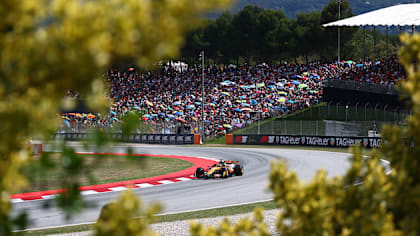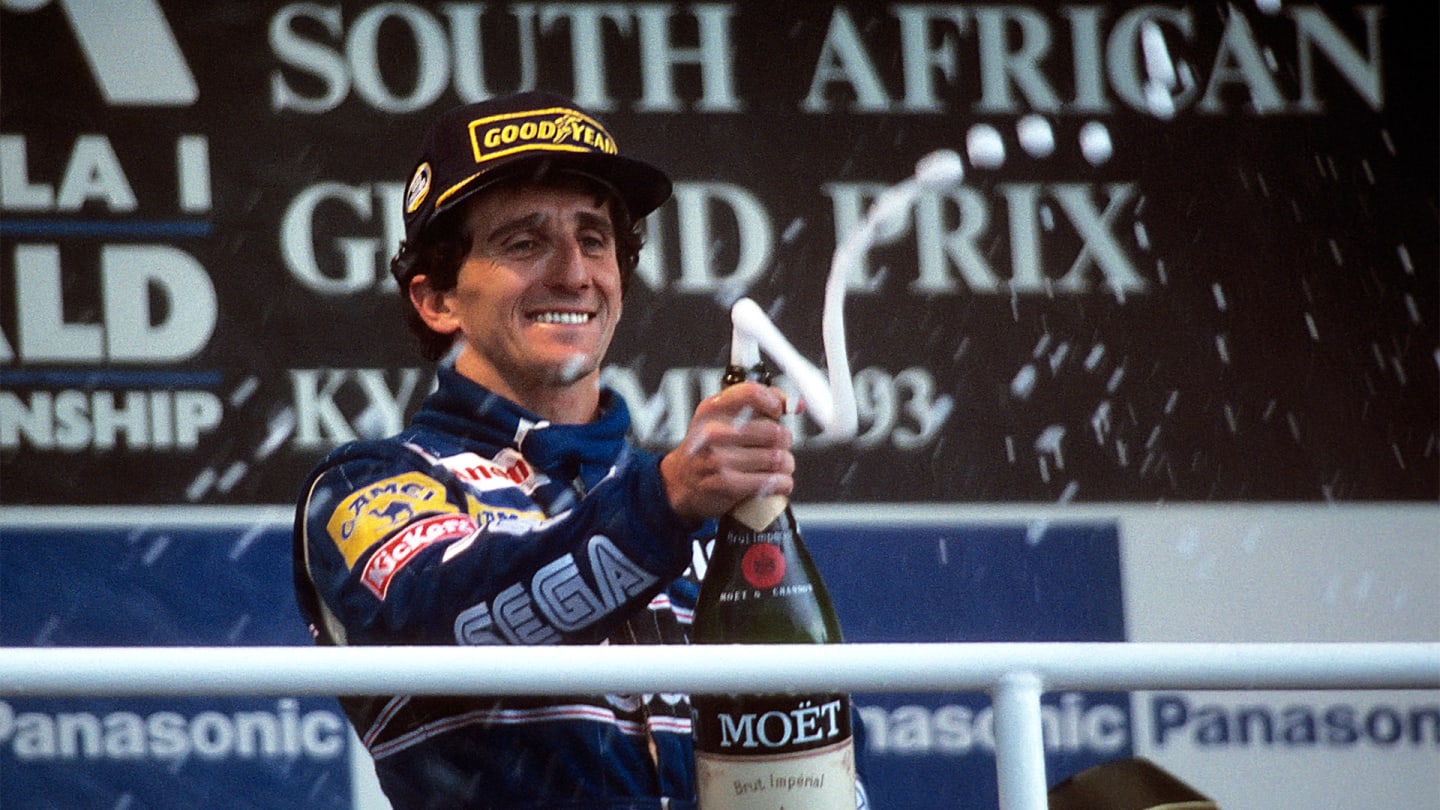
FeatureF1 Unlocked
FULL TRANSCRIPT: Read every word from four-time world champion Alain Prost's insightful Beyond the Grid interview
Share

On this week's episode of F1's Beyond The Grid podcast, Alain Prost sits down with host Tom Clarkson to discuss everything about his 1993 World Championship-winning season – along with his rivalry with Ayrton Senna, his former engineer Adrian Newey and much more...
Below you can read the full transcript of the episode – or alternatively, listen below in the audio player or head here to catch it on your preferred platform.
Tom Clarkson: Alain, it is fantastic to have you back on the podcast. How are you?
Alain Prost: Yeah, not too bad, thank you. I mean, all good, in fact. All good.
TP: Now, Alain, time flies, doesn't it? 30 years since you won your last World Championship. Of your four titles, How do you rate that '93 season?
AP: Excuse me to be a little bit brutal. That is maybe the worst, in fact, you know, because it reflects more or less, I'm going to be very direct, but the way I've been treated sometimes in my case. Because '93 was a very strange season. I signed my contract with Frank very very soon, beginning of '92, in fact, when I had my sabbatical year. And we started to have the argument, you know, with Ayrton wanting to drive, but it was in the plan, it was done. I mean, the only thing I asked to Frank, when we met for the first time talking about the contract that was in Paris, Le Bourget at the airport. I said, okay, you give me the money you want. And I don't want to be number one in the team. But the only thing I ask you, I cannot be a team mate again with Ayrton. And he said yes, for sure, I understand. And we can put the clause on that, that started like this.
But the whole season was really difficult because... I don't want to go through all the episode about the season, but I never said never. Obviously, when you win a race with the Williams at the time, you know it's normal, when you lose you're stupid and it's not exactly what a racing driver is aiming for. You need to have a sort of objective situation and that was not very nice season. And when we started to have the problems, was when Frank came to me and said that, 'I have pressure from Renault, because they want me to take Ayrton and I know that we have a contract' and I said, 'Shit', you know. That's not the best way, I had the two-year contract. I know I was very supported by Patrick and Adrian. But you know, we were not in the sport each side. I said, you know I want to fight against Ayrton, no problem, but on the track, no problem, but not as a team mate. So, I cannot accept that. That is why the whole '93 season at the end was not my best, on the human side.
TC: Let's talk about the competitive side, first of all, because it seems to me 1993 was the first time in your career in which you'd gone into the season expecting and expected to dominate. How did that feel? And how did it change your approach?
AP: It changed because of the perception of the people outside. Because for you, when you're a racing driver, I mean, obviously ask Max today, because he has a dominating car, I mean, he's not going to change anything. He's going to try to win all the races he can and win the championship. And for me, it was the same, it was a new technology. It was a new car, a new way of setting up the car or even working with the engineers, which was not my best car, you know, my favourite car. In terms of, I'm used to doing more or less everything by myself, working with the engineers, and with the active car it was more done by the engineers, the working on the computer, you know, working on suspension.
So that is maybe the biggest problem. But otherwise, I didn't have a very different approach. I had a fantastic team mate with Damon. He was very helpful. He had more experience than myself on the active car because he was testing the car before, so it was all different. But at the end your philosophy is the same.
The only big difference is we are fighting against Ayrton with a very, very good chassis because in fact I drove the same [McLaren] chassis the year after, with the Peugeot engine. Maybe not the same powerful engine, that is obvious, and all. But for me he had a better suspension, a better electronic on the car and that's what we saw also in Donington, on the wet, where we were struggling with the downshifting and things like this. But you cannot explain that. At the end of the day you could try to explain why you are good or why you are not as good. Nobody understands that in this situation, you know, you always take that the defence of 'the driver looks weak in terms of car', which was not true everywhere. Some places for sure because our engine worked much more powerful, that is true but it was very difficult to drive, very difficult.
BEYOND THE GRID: Alain Prost on Ayrton Senna, his 1993 title – and almost rejoining Ferrari
TP: So that was its biggest strength was the FW15's engine, because you say the McLaren had the better chassis, the better electronics. So if I was to say to you what was the Williams greatest strength, you'd say the engine?
AP: If you compare to the competitor's engine first, but obviously it's always a package. The car was really good in some places, much more difficult to drive other places and the position in the car for me was not that comfortable to what I wanted too. Even Ayrton had a problem, you know, when he replaced me. It was not that easy, you know the gear change, until the middle of the season where we improved that. It was a difficult car to drive considering the performance. Obviously it was very powerful and there were no places where we were, you know, far behind. But at the end of the year if you remember, the last two races in Japan, in Adelaide, I've tried to do my best to finish with the win, but it was not possible. The McLaren was much quicker.
TP: So where was the car at its best? I mean, was it on an open racetrack like Silverstone, where you got your 50th. What was that the sort of racetrack it really shone on?
AP: Yeah. You did not want to have too many bumps. I mean, if you had like Silverstone, you know, obviously long straights, you could get the engine making small differences and the fast corners. I mean, average speed corners was maybe the best, the car was good but it's difficult to tell because if you had to try like Silverstone... I remember when we were fighting with Ayrton, there was some places where I was much quicker. Some places where he was much quicker, you know. It looks like a heavy car sometimes and we had a light car, which was not the case I suppose, but you know, we forget that these two cars are very different technology. In fact, you know, we are talking about active car. But you have different ways to make the active car working. If I look at Nigel's car the year before that I tested in Portugal, it was more like a normal car. It was active but it was more like a controlling the ride height. You know, the way that '93 car was more like a complete active car, you know, with no anti-dive, things like this. And it was making the car much more difficult, much more difficult also to set up, and to find the right balance. But you having the right balance, that would be a fantastic car.
TC: So if you combine the '93 active system with things like ABS, traction control, what kind of a feel was the car giving you?
AP: My style of driving and lifestyle also, I think trying to set up the car is quite different to a lot of drivers. For example, with the Williams, we had the possibility to use the power steering and the ABS on the brake. If I remember, I never used it. I've tried many times. So, maybe one race. I don't remember where it was. I wonder if it was not Silverstone, maybe we could ask Patrick. But I did not like it because first of all, I did not have the right feeling for setting up the car, not the way I wanted to. And when I put the active, the power steering or the ABS, I was losing even more some feeling. It was not good for me or my driving style.
TC: Just out of interest was Damon using power steering and all of those tricks to help him? And you weren't able to?
AP: Yeah. I could have been able, but I did not like it. I preferred to stay, let's say, the old way.
TC: Alain, you must have been so strong to drive those cars without power steering, for goodness' sake.
AP: It was not a problem. It's 30 years ago, so I don't remember which race I used it because maybe it was a little bit too heavy in terms of steering but I do not remember if that was the case.
TC: That '93 season also saw narrower front and rear tyres as well. What difference did that make to the handling?
AP: Well, if you remember, I had the stronger argument with Max Mosley at the beginning of the year about the new rule, because in fact we put these narrow tyres for safety reasons. And in fact, what I was saying at the time, I remember after my test in Portugal I said, why we don't test these tyres before we make this decision to introduce them. It was not, maybe, a bad idea, but at the end of the day you were quicker in the straight and not much slower into the corners. So it did not make a big difference. You are racing, normally you can adapt your style to almost everything. That was not the big, big change.
TC: Alain, tell us a little bit more about what it was like racing for Williams. First up, how did the team compare to McLaren in particular? You know that other British titan?
AP: Yeah, that's a difficult question for me because as I said before, you know, the whole ambiance was a bit strange. You know, you had obviously the Williams team and then you had the Renault on one side and then you had Ayrton... you know, signing and they were trying to get there to him. And the media – because the media, they were not very nice to me, you know, at the time, which because you know, as I said, you support the guy with normally the weaker car. At McLaren I had a different period if you take that. With Niki, with Stefan and with Keke it was fantastic. With Ayrton, the first year was really fantastic, a big fight. '89 was again a nightmare because of the situation but at McLaren I had much more of a family team. It is difficult to compare because I was really good friends with Ron and especially Mansour from the beginning and for many many years.
So it was a bit different and when Ayrton came for sure our friendship was a little bit different. I always wanted to support the team and get the best decision for the team. That is why also I have supported the fact that Ayrton should come in the team and not Nelson at the time.
TC: Could you have vetoed Ayrton's arrival at McLaren?
AP: I mean I had nothing contractually. But I think it would have been easy for me at the time to say no I prefer to have Nelson, I prefer to have somebody else. And when we were in a meeting in Japan, you know, with the Honda people, we were talking about that, we were going with Nelson which is a good friend, but I said why you don't take the young guy? I mean Ayrton is the future of Formula 1. He should be the future of the team. Saying that today looks stupid, you know, but that that was the philosophy at the time. I was always doing everything for McLaren. I was going with Ron to all the important meetings. I was going to find sponsors, I mean all the sponsors had been mostly with Ron, together. You know, that is not the way that you are working now in Formula 1, you know, it is very, very different. So with Frank, with Williams, it was a different atmosphere. Very very close with the racing team. Very very close. But it is also an attitude that for certain drivers, like me where you are sensible, you want to have some other relation, it's different. It's a different culture. I really do not criticise. I do not criticise at all. But this ambiance is good for some drivers and maybe not so good for other drivers. McLaren at the time, I don't know the team today because it's different, but I think everybody could feel more or less quite well, except that sometimes they have a favourite, you know, but at least you are in the family.
TC: It seems to me that at McLaren you were more than just a racing driver, whereas at Williams you were just that. The racing driver.
AP: Yes, I mean, but it's not hidden, I mean I'll be honest about that. You know, you are racing driver so you are an employee. So you do more or less what we want you to do. I remember when I made my seat the first time at Williams, you know, I mean I was struggling a little bit, it was difficult. I mean I'm already a pain in the ass, you know, sometimes, to get a proper seat because I like my good position, the comfort, everything. At the end of the day they said, no, sorry, but you have to make the seat with Nigel. So I took Nigel's seat and then I modified everything, you know, adapting Nigel's seat, you know, because it was easier to to make it like this.
And then Ayrton was complaining about a lot of different things. He was calling me many times to ask me for advice. So it's a different culture, different mentality, and you have to accept it that when you're there, when you're, you know, if everything goes well, it's fantastic. But on the human side it's not as easy as other places.
TC: What was it like working with Patrick Head and how did that experience compare with someone like John Barnard at McLaren?
AP: I think that they have a very similar culture. I loved working with both, you know, John and Patrick. Honestly, Patrick was much stronger, that means sometimes he could be a little bit more brutal, you know. But they are very passionate people, passionate about technology and I think John was maybe a little bit more open. If you tell him, John sorry, but it's not working, or it's not the way to go or no, he would accept it more than Patrick. Patrick was really leading really strong. Again, because the philosophy is the driver should not be too important, you know, and the philosophy of McLaren at the time with John was maybe a little bit easier.
TC: One more technical person I'd love to ask you about was Adrian Newey, because of course he designed the FW15C He's still going strong today. What did you make of Adrian all those years ago?
AP: I mean, I worked with Adrian for sure at Williams but also a little bit at McLaren, but in a different role. I remember the '93 season and even after looking at him and even now looking at him from outside you see him very often and he's very different. Because I remember Williams '93, obviously you could be very confident with Adrian, but don't forget that Patrick was above him. In a way it was a bit of different organisation, but I loved talking to Adrian.
Adrian is listening to you, asking questions all the time. You never have an argument with Adrian. You're talking with Adrian and he is listening and then he does what he thinks is the best, but he never tells you what he's going to do or if you're right or if you're wrong. Nothing. Just listening and talking. I loved that. You know, that is why he's the best. Because, you know, everybody thinks that Adrian is still the number one engineer. I mean, I don't know now, but he was at McLaren and I remember going in his office and the drawings, some part of the car, saying it's unbelievable. But also the way he's working and listening is fantastic for the engineers working with him. It brings energy and that synergy in terms of the brain, the capacity is fantastic.
Unlock exclusive F1 content and more with F1 Unlocked. Totally free.
Membership gets you closer with:
- Curated insider content
- Live like an F1 insider with exclusive access and VIP experiences
- Member benefits, rewards and offers
Already have an account?
Sign InYOU MIGHT ALSO LIKE
News Hamilton sets podium target for Spanish GP after moving ‘in the right direction’ with P5 Qualifying result
FeatureF1 Unlocked PRACTICE DEBRIEF: Can Red Bull or Mercedes take the fight to McLaren at the Spanish Grand Prix?
Live Blog AS IT HAPPENED: Follow the action from Spanish GP Qualifying as Piastri takes impressive pole
News Piastri relieved to grab pole ahead of ‘interesting’ race in Spain as Norris blames ‘little mistakes’ for missing out
